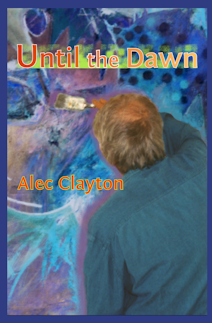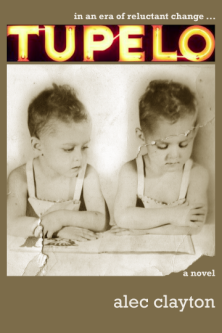by Alec Clayton
My first novel was Until the Dawn, published in 2000. It told the story of the Red Warner who was born in the early 1940s and grew up in Tupelo, Mississippi.

After publishing that novel, I thought I was done writing about Tupelo, where I was born and lived until I was twelve, but memories of the town kept calling me and insisted on being put in a story.
Sixteen years later, I wrote Tupelo, the story of the town across almost three decades as told by Kevin Lumpkin, the youngest (by six minutes) of a set of twins—Kevin and Evan.
The challenge of writing about a town I had already written about came when I started writing about the house that Kevin and Evan grew up in. I wanted it to be like the house I lived in. I loved that big, white house with the wrap-around front porch and a back yard that was like a football field for me and my brother.
But it was Red Warner’s house in Until the Dawn. How could it be the Lumpkin twins’ house in Tupelo? I solved that problem easily enough by saying Evan and Kevan lived next door to Red Warner in an almost identical house.

Further challenges quickly appeared when I realized that not only was I creating a world I had previously created set in the same time period, but also in an actual town that demanded to be realistically depicted. Tupelo at the time was a small town, population slightly under10,000. At any given time, the number of kids attending Church Street Elementary or Malcolm Junior High would be small enough that everybody would know everybody. So I had to figure out how to write about all the same kids and their parents while making them simultaneously different than and just like the same characters in the earlier book.
That problem loomed large when the story crawled into the 1960s. In those years in the first book, a young man was put on trial for rape and murder. It was a legendary (fictitious) crime. People from miles away came to Tupelo to sit in the courthouse. It was covered by regional newspapers and television stations in Memphis, 115 miles away.
They came from all around: from Pontotoc and Oxford and Water Valley, from Guntown and Aberdeen, from as far south as Starkville, farmers in pickup trucks with grain sacks tied to their bumpers, good old boys with kitschy do-dahs like plastic Jesuses and foam rubber dice and baby shoes dangling from rear-view mirrors; ladies with starched, white dresses that crinkled like paper when they sat down, pale ladies with paper fans in hand, daintily decorated fans adorned with farm scenes and pictures of Jesus walking on water and advertisements for Moore’s Funeral Home and Brother Bobo’s Hardware, fans that (thank the good Lord) would not be needed because the city had finally installed air conditioning in the court house (but, of course, Mabel Cook and a couple of other women would use theirs for appearance sake); teenage boys in outmoded outfits, jeans with rolled cuffs and T-shirts with rolled sleeves, crumpled Marlboro packs enveloped in that twist of sleeve at the shoulder; businessmen in cotton and polyester and seersucker suits, coatless, or with coats slung over their shoulders, ties loosened and collars open, sweat circled armpits; round, Negro women with umbrellas to protect them from the sun.
They came and they clustered and shuffled for seats, a legion of characters and types mixed like Campbell’s soup, with the blacks segregated into a shadowy, ashen-gray section in the back.
~ Opening of the trial scene in Until the Dawn
So you read the first book, and then you got to that time period in the next one, would you wonder why there was no mention of the trial? It was too big to be ignored. It would be like a story about Money, Mississippi in 1955 with no mention of Emmett Till. So I had to retell the story but make it different—and believably so. I wrestled with that problem but finally came up with a simple solution. Since the story was narrated by Kevin Lumpkin and Kevin was a college student at the time, I made him a journalism major and had him cover the trial for a class project. Therefore the trial coverage is told from a totally different point of view. And as a bonus, I wove a romance around Kevin’s coverage of the trial. An old girlfriend he hadn’t seen in a couple of years happened to be seated behind him in the courthouse. They struck up a conversation, and a brief summer fling ensued.
I hoped the trial of Man in August of ’67 would be like the trial of Tom Robinson in To Kill a Mockingbird but with a different outcome. I mean the journalist in me wanted that. The me in me wanted Wanda’s death to be proven accidental. I decided to attend every day of the trail as a reporter even though I didn’t have a paper to report for. I hoped I could use it as part of my graduate thesis. I figured the thesis committee would eat it up. Besides, I knew the defendant. Not very well, but I had met him. I imagined we had some kind of special connection. Raymond Carver, known as Man, was not named after the famous writer. Nobody had yet even heard of that Raymond Carver. This Raymond was the kid who lived next door to Maddie Jean, I mean Ali—one of the kids who was bitten by the same rabid dog that attacked me and Evan. A few years earlier he had gained local notoriety for staging a one-man sit-in at the lunch counter in the Rexall Drugs downtown. He was in the army at the time, home on leave and wearing his uniform. He sat immobile and silent when some snuff-dipping redneck poured a cup of hot coffee over his head. He curled into a self-protective fetal position when that same redneck and his buddies pulled him off his lunch-counter stool and beat him. He did not resist when he was dragged to the city jail where he was kept overnight and fined two hundred dollars for disturbing the peace. A month after getting out of jail he was in Viet Nam, where he was wounded—not badly, thank God—and was sent back home and given a medical discharge.
~ comments on the trial from Kevin Lumpkin in Tupelo
So it was the same trial with the same verdict, but in Until the Dawn it was all about Red Warner, and in Tupelo the focus was on the Lumpkin twins. Red Warner was in the courthouse but barely mentioned. To steal a few words from Vonnegut, and so it goes.
Until the Dawn on Mud Flat Press
Tupelo on Mud Flat Press
